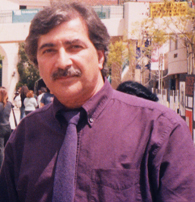Securing Justice and Survival: An Interview with Dr. Levon Marashlian
 Levon Marashlian is a Professor of History at Glendale Community College, teaching Armenian history and Diaspora current affairs. In 1996, he testified before the US House of Representatives during a hearing on the Armenian Genocide and has also testified in favor of legislation mandating the teaching of the Armenian Genocide in secondary schools. He is the author of numerous publications, articles, and letters to the editor in scholarly journals and the general press regarding the Genocide. He is also a frequent commentator on such matters in the US and Armenian media.
Levon Marashlian is a Professor of History at Glendale Community College, teaching Armenian history and Diaspora current affairs. In 1996, he testified before the US House of Representatives during a hearing on the Armenian Genocide and has also testified in favor of legislation mandating the teaching of the Armenian Genocide in secondary schools. He is the author of numerous publications, articles, and letters to the editor in scholarly journals and the general press regarding the Genocide. He is also a frequent commentator on such matters in the US and Armenian media.
Haytoug sat down with Marashlian to discuss the contemporary reasons why securing justice and reparations for the Armenian Genocide are important for the survival of the Armenian nation.
HAYTOUG: In addition to the killings and massacres, you’ve written extensively about the Turkish government’s systematic effort to rob Armenians of their wealth and possessions during the Genocide. What would you say to those who argue that the modern Republic of Turkey bears no responsibility for these crimes since they were committed under the Ottoman Empire?
LEVON MARASHLIAN: There’s an ethical and legal dimension to this question. Legally, there’s a statute of limitations for most crimes. I don’t know what it is internationally but, based on most statute of limitations laws, Armenians are late. At some point, you can no longer try to get justice. But when the crime is genocide, they don’t have to necessarily be limited to a statute of limitations. That’s the legal aspect.
That’s one of the reasons why the “g-word” is so important for Turkey. Once it’s genocide, it opens up the possibility for negating statute of limitation laws. Again, I can’t speak on that in detail; you need a lawyer for that. But it does open up the possibility.
The ethical aspect is, if a new government is not liable for the deaths of the previous government, then why does it get the assets of the previous government? So a new government does have a liability. In fact, this is often written in treaties. For example, if one country gets a piece of another country after a war, in the treaty they will include something like, “The country that gets this territory now has to take on the obligations of that part of the old country.” So, if someone in that section of the country you got owes something—let’s say, to a foreign company for building a bridge—now that you’ve got that land, you are going to pay that company for the bridge they built fifty years ago.
There’s a continuity of responsibility and a continuity of benefit. So, that’s not a good argument.
H: You mentioned the ethical and legal aspects. In the past, you’ve also discussed the importance of reparations in terms of survival and security for the Armenian Republic. Can you talk to us about that and explain how reparations can help ensure Armenia’s viability?
L.M.: It seems that more and more people seem to think that an apology from Turkey is enough. Especially after Armenia became independent, the number of such people seems to have increased. Their argument essentially goes like this: Now we have a Republic and it is poor; it has problems. Spending all of this energy and money on Genocide recognition is preventing us from helping Armenia more, and asking for Genocide recognition is contributing to keeping the border closed. We should forget the past and downplay the issue so that we can better assist Armenia.
So, for some Armenians, the Genocide issue becomes a liability for Armenia. One of the people who thinks this way, for example, is Alexander Arzoumanian, the previous Foreign Minister of Armenia. He thinks that we keep pushing these resolutions and it just hurts us, so we should focus instead on developing the country.
What people who think this way are missing is that some kind of reparation from Turkey is primarily needed by Armenia. That Armenia needs a huge influx of resources is undeniable. The aid they get from the Diaspora and the investments are not enough. Armenia needs a huge amount of money from outside. Resolving the Genocide issue the right way could bring Armenia the financial resources it needs. Without those financial resources, my fear is that Armenia doesn’t have a very bright future.
And Turkey knows that very well. One of the purposes of the Genocide was to make Armenians irrelevant in that region. If Armenia stays in its present situation, it will become increasingly poorer. It will depend more and more on Russia. Eventually, it might become a country that is independent just in name. It is already heading in that direction with Russia taking ownership of so many strategic industries such as hydroelectric plants, and so on. Armenia needs something big, something concrete—whether that’s territory or financial.
So, for Armenians who think the way of Arzoumanian, the answer is, on the contrary, rather than being a liability, justice for the Genocide issue may be Armenia’s only salvation.
By the way, when I say this to most people in Armenia, they agree. Every person I’ve talked to says, “Yeah, that makes sense but what are we going to do.” And my answer is, I don’t know what we’re going to do to get there but that has to become the focus. It’s not easy to get something from Turkey but once you reach the premise that without something, you don’t have a future—or at least a good future—then you have to focus on getting something. The danger is when people think that trying to get something is bad for Armenia. That is wrong.
H: What are your thoughts regarding the applicability of the Treaty of Serves today, since many people have that on their minds when they think of Armenia’s legal and national claims against Turkey?
L.M.: The Treaty of Sevres has a very important value. Whether it’s valid legally or not, you would have to ask an international lawyer. But even if it is not legally valid, it still has a very important validity because what it says is, in 1920, the opinion of the world—not just the opinion of Armenians but that the of the Great Powers and all of the countries connected to them (Japan, the US, France, Italy, Britain, and the Ottoman government)—was that justice requires that Armenians get so much. That’s a compelling statement isn’t it? It’s the opinion of the most powerful countries of the world and those countries exist today.
It’s also the opinion of the US State Department. That is perhaps the strongest value of the Treaty of Sevres. It’s not like Armenians were dreaming that this is what we deserve. [The borders demarcating Armenia were] the opinion of experts in the Geographic Department of the US State Department, on the order of the US President.
If the Treaty of Sevres didn’t mean anything, then Turkey would not have internally what is called the “Sevres Syndrome.” Every year, in August, they write articles in Turkey . . . they actually go into a frenzy. One Turkish author, a few years ago, wrote about this asking, “Why is it that every year we go crazy?” The Turks call it our “Sevres Syndrome.” Why do they have this syndrome if the Treaty has no value? If the Turks thought that financial reparation and territorial reparation is impossible, why would they worry so much?
The worry because they know it has value. I should mention here that when they have “Sevres Syndrome,” it’s not just with Armenia. It also includes Kurdistan and other matters. So it opens up a lot of issues for Turkey.
Now obviously, Armenians have to be realistic. Armenians cannot now imagine they could get everything in the Treaty of Sevres. That’s unrealistic to expect that. But my feeling is that it is realistic to expect something. I won’t even define what that something is because then you begin sounding like a dreamer. But something, no matter how small, will be helpful to Armenia.
H: What are the incentives, if any, for the Turkish government and people to come to grips with the crimes committed against Armenians and pay the just compensation they owe?
L.M.: Most Turks will react to this issue with hostility. If they don’t want to admit to the Genocide now, they’re not going to want to have reparations. As far as what I think Turks can gain if they made reparations, I think they would get a lot out of it. I’m not saying they would do it but they would certainly get a lot out of it.
Let’s just imagine that they recognize the Genocide and give some kind of reparations. That would make them look great. It would give them prestige. Their image would skyrocket in the world. Think of how it would look: “Turkey Apologizes and Makes Compensation.” What will happen to their image? They will go from being the “Terrible Turk” to the being the “Generous Turk.”
It’s like Germany. The Germans hold their head up high now. They know what happened, they’ve admitted it and, now, you don’t have constant Jewish resolutions against Germany every year or demonstrations against Germany. They’re not reminded constantly about the Holocaust. Sure, there are films on the Holocaust and educational projects but they’re not constantly attacked wherever they go.
Turks, on the other hand, have this burden that they’re carrying. They have this albatross around their neck. And it’s rotten, it stinks. It would be good for them to get rid of it.
H: Do you have any message or final words to our readers, especially the youth, when it comes to this issue of reparations for the Armenian Genocide?
L.M.: My suggestion is that if young people hear their fellow youth or adults, such as their parents, say something like, “Forget any kind of compensation. We should just push for Genocide recognition, get the Turks to admit it, apologize, and move beyond it.” If they hear something like that, my suggestion to young people is to correct them and to tell them how important some kind of compensation is for the survival of Armenia.
Getting compensation is correct morally also; it’s correct ethically. But it’s not as if Armenia is so wealthy that a few dollars from Turkey is not going to make much difference and we just want it solely for justice. Armenia desperately, desperately needs huge amounts of money. Anybody who goes to Armenia knows what is needed.
Especially if older, more mature Armenians hear this from young people it can make an impact. It might even make them feel embarrassed.
Photo captions:
MarashlianPlazaVaquero: Professor Levon Marashlian
Apostles2: The ruins of the Church of the Holy Apostles in historic Ani
Gen_1: Genocide vicitim mother and child


Leave a Reply
Want to join the discussion?Feel free to contribute!